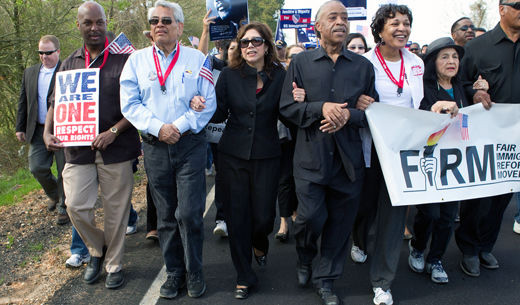
When newly elected Connecticut Secretary of State Denise Merril, a Democrat, attended her first national meeting last year, she was stunned to discover that her Republican counterparts across the country were all focused on how to keep the number of voters down in their states.
“In my opinion, it is not only a right, it is an obligation for every eligible person to vote,” Merrill said at a recent labor luncheon.
Her reaction to that national meeting was to come back to Connecticut and introduce a legislative package that would open up the voting process and make it easier for everyone to participate. She studied what could make it easier for voters with low incomes juggling several jobs, students, and voters with small children, elderly voters, and voters in communities of color.
As a result, in this legislative session Connecticut became the tenth state to enact Election Day voter registration beginning in 2013, and the tenth state to enact an online voter registration option beginning in 2014.
The battle for voting rights is front and center in this presidential election, where turnout will be key. Voters in states representing 70% of the electoral vote will be affected by restrictive laws this year, many requiring specific forms of ID promoted by the right-wing American Legislative Exchange Council (ALEC).
Other limitations include restricting voter registration drives, limits on when or where people can register to vote, cutting back on early voting and improper purging of voters from voter rolls.
It is estimated by the Brennan Center for Justice that as many as 5 million voters could be blocked from casting their votes as a result of these laws. Those voters most highly impacted will be African American and Latino, low-income, elderly and young.
The Connecticut example of opening up the voting process is a positive push for the Voter Empowerment Act of 2012 HR 5799 introduced in Congress last week by Rep. John Lewis, D-Ga., and 130 co-sponsors. The goal is to make it easier for voters to cast their ballots and stay on voter rolls.
Lewis, who was brutally beaten during the march for voting rights from Selma to Montgomery, Ala., in 1965, understands clearly the dangers to democracy that voter suppression represents. This year he re–traced those steps with thousands of labor, civil rights and immigrant rights leaders from around the country.
“The ability to vote should be easy, accessible and simple. Yet there are practices and laws in place that make it harder to vote today than it was even one year ago,” said Lewis.
“The sponsors of this act believe we need to take action or risk losing the liberties we have enjoyed. We should be moving toward a more inclusive democracy, not one that locks people out,” he concluded.
The Voter Empowerment Act of 2012 would enable online voter registration, Election Day registration and automatic voter registration at government offices. It would also require 15 days of early voting, which many states do not offer. In addition, the bill would automatically restore voting rights to ex-felons after they complete their sentence.
Earlier this month, the NAACP launched “This is My Vote,” the largest voter registration, education and turnout project in its history. The 50-state campaign is aimed specifically at communities of color, youth and elderly voters, involving students, civil rights groups and the National Baptist Convention’s 10,000 congregations.
“When voter suppression is the problem, voting is the answer. America hasn’t seen a coordinated attack on voting rights of this scale in over a hundred years. But we can turn this situation around if we vote,” said NAACP President Benjamin Todd Jealous.
The demographics of our country are rapidly changing. Texas is already a majority minority state. Our nation’s population is younger and more culturally diverse, especially with Latino growth. It is also becoming more progressive. Taxing the rich has overwhelming support, as does ending the wars.
Hate groups, the tea party and the Republican right wing are the modern-day attack dogs and hoses attempting to suppress the vote of African Americans, Latinos, women and youth.
Protests have forced ALEC to shut down their “Public Safety and Elections Task Force,” which pushed voter-suppression and Stand Your Ground laws through many state legislatures.
A lawsuit brought by Shelby County, Ala., to end Section 5 enforcement of the Voting Rights Act has been rejected on the grounds that instances of voter discrimination were overwhelmingly found in Southern areas.
This week the Advancement Project and five other organizations called on the Department of Justice to take action to halt and investigate a sweep of voter rolls in Florida requiring thousands of voters, mostly Latino, to produce proof of citizenship within 30 days, implying that they were voting illegally.
“What’s happening now, is not only illegal but it’s inaccurate,” said Katherine Culliton-Gonzalez, director of voter protection projects. “There are actual citizens on these lists. So, what’s happening is completely counter to the fundamental principles of our democracy.”
Just as history was made in Connecticut after many years of attempts to enact Election Day voter registration, the movement is building nationally for a historic voter turnout in 2012 despite all the obstacles.
“We’ve been dealt a dirty hand but the solution is not just to accept that. We are putting in place a plan to reach, one way or the other, every single person potentially disenfranchised in all these states,” says AFL-CIO Executive Vice President Arlene Holt Baker. “That means on the job, online, in the neighborhoods, at their doorsteps, in the churches – everywhere.”
Marching in Alabama with Rep. John Lewis as they re-traced the 1965 voting rights route she said, “Together we are one. Together we will make change.”
Photo: Creative Commons 3.0 Some of the participants in the 2012 re-enactment of the march from Selma to Montgomery.












Comments